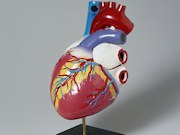Pronounced benefit for patients with STEMI, but no significant effect for patients with NSTE-ACS
FRIDAY, Feb. 9, 2018 (HealthDay News) — For patients with acute coronary syndrome (ACS), treatment with direct oral anticoagulants (DOACs) in addition to antiplatelet therapy (APT) appears efficacious for those with ST-segment elevation myocardial infarction (STEMI), according to a review published online Feb. 7 in JAMA Cardiology.
Mauro Chiarito, M.D., from Humanitas University in Milan, and colleagues examined the safety and efficacy of DOAC in addition to APT after ACS using data from six trials with 29,667 patients (14,580 patients with STEMI and 15,036 with non-ST-segment elevation ACS [NSTE-ACS]).
The researchers found that the risk of the primary efficacy end point (composite of cardiovascular death, myocardial infarction, and stroke) was significantly lower for patients treated with DOAC versus APT alone (odds ratio, 0.85; 95 percent confidence interval, 0.77 to 0.93; P < 0.001). Patients with STEMI had pronounced benefit (odds ratio, 0.76; 95 percent confidence interval, 0.66 to 0.88; P < 0.001), while patients with NSTE-ACS had no significant treatment effect (odds ratio, 0.92; 95 percent confidence interval, 0.78 to 1.09; P = 0.36; P for interaction = 0.09). Compared with APT alone, DOACs were correlated with significantly increased risk of major bleeding, with consistent results for patients with STEMI and NSTE-ACS.
“To our knowledge, these findings are the first evidence to support differential treatment effects of DOAC in addition to APT according to ACS baseline clinical presentation,” the authors write.
Several authors disclosed financial ties to the pharmaceutical and medical device industries.
Copyright © 2018 HealthDay. All rights reserved.








